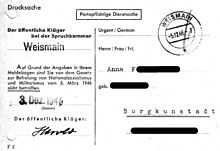Persilschein
Persilschein is a German idiom and literally means "Persil ticket". To own or have a Persilschein is akin to having "a clean bill of health" and may refer to the granting of a wide-ranging permission or "carte blanche" to pursue a business or a previously morally or legally suspect interest.
Origin
The term originated in the German military and refers to Persil washing powder. For example, it was common for army recruits to have to bring an empty box with them to the barracks in order to send their civilian clothes home to their family. Boxes advertising the very common washing powder, Persil, were often used for this purpose. In soldier's jargon the actual conscription order was also called a Persilschein.
Denazification certificates
The term Persilschein underwent a change of meaning, especially during the denazification period. Suspected Nazi offenders could be exonerated by statements from victims or former enemies and thus accepted as having a good reputation, a record of which was sufficient to meet Allied requirements under the denazification law.
Colloquially the affected person was said to be "washed clean" of accusations of Nazi sympathies; "cleanliness" in this context meaning "innocent". They were attested as having a so-called "white vest" and were now allowed to apply for a house or open a business again. During 1948, the interest of the Americans in systematic denazification waned markedly as the Cold War and the threat from the Soviet bloc hove increasingly into view. Faster processes were introduced to bring denazification to a swift conclusion, something that led to many questionable judgments (see also 131ers).
Text from the US Certificate of Good Standing

On the certificate of good standing used in the American Zone of Occupation which indicated that the individual had not committed any war crimes and had a certified flawless political past which entitled him or her to employment and income - it read, " Based on the information in your registration form, you are not affected by the law on the liberation from Nazism and militarism dated 5 March 1946."
Literature
- Ernst Klee: Persilscheine und falsche Pässe. Wie die Kirchen den Nazis halfen. Fischer-Taschenbuch-Verlag, Frankfurt am Main 1992, ISBN 3-596-10956-6 (Fischer-Taschenbücher 10956 Geschichte).
- Jan Zweyer: Persilschein. Grafit Verlag, Dortmund 2011, ISBN 978-3-89425-615-9.[1]